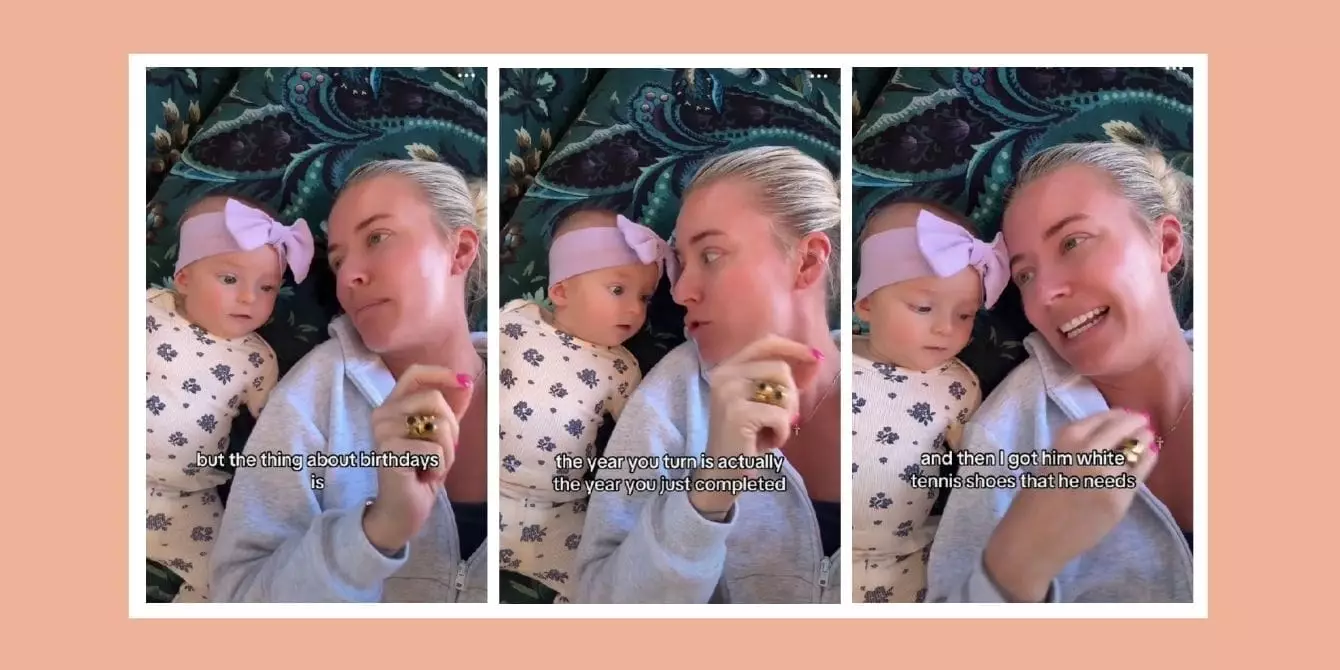Amidst the flurry of social media content surrounding motherhood, one TikTok creator, @justalexbennett, stands out with her refreshing approach to speaking with her infant daughter. Instead of resorting to the typical baby talk adorned with sing-song melodies and cooing sounds, Alex presents a different narrative: a candid, humorous monologue that mimics the tone and delivery of a reality show confessional. This distinctive style has captured the hearts of many, gathering millions of views and sparking a fan club in the comments section. But what lies behind this popularity, and why may it be vital for both mother and child?
Rather than limiting her discourse to basic words and phrases, Alex engages her daughter by treating every moment, mundane or significant, as a subject worthy of discussion. By discussing everything from daily routines to her thoughts on life, she takes conversational engagement to new heights. This change in perspective could play an integral role not just in language development but in emotional growth and connection.
The Science Behind Engaging Conversations
Research underscores the importance of how we communicate with our children, revealing profound implications for cognitive and emotional growth. While many of us are familiar with ‘infant-directed speech’, which uses a higher pitch and exaggerated sounds, studies have indicated that the use of adult-like language can yield equally, if not more significant, developmental benefits.
According to findings from the National Library of Medicine, the caliber of conversation matters far more than merely the number of words spoken. Alex’s engaging narrative style might seem like a personal outlet for her thoughts, yet it serves a dual purpose. By involving her baby in thoughtful discourse, she provides a wealth of rich vocabulary and meaningful emotional cues necessary for nurturing lifelong communication skills.
The value of conversational turns cannot be overstated. It is not merely about talking at a baby but interacting with them—encouraging coos, smiles, and giggles as a precursor to language development. This back-and-forth communication serves to enhance brain activity in regions responsible for speech comprehension, providing a robust foundation for future learning.
Motherhood: Between Isolation and Connection
Despite the myriad joys that come with new motherhood, feelings of isolation can often permeate this life stage. A study from 2021 highlighted that many new mothers feel profoundly lonely during the initial months. Alex’s no-nonsense chat approach with her baby transforms what could be a solitary parenting experience into a shared journey of discovery and emotional connection.
For mothers grappling with profound feelings of loneliness, engaging in substantive conversations with their babies becomes a vital strategy for emotional resilience. The therapeutic nature of ‘real talk’ with an infant allows mothers to verbalize their struggles and victories, fostering a sense of agency and identity that may otherwise feel lost in the challenges of new motherhood.
Moreover, by providing a candid depiction of her daily life to a silent audience, Alex not only lays the groundwork for her daughter’s language acquisition but also preserves and celebrates her maternal identity. This reflects a crucial understanding that parenting is as much about nurturing the parent as it is about nurturing the child.
Reconceptualizing Parental Input
As Alex Bennett’s TikTok videos demonstrate, the way we communicate with infants can forge the early pathways of their neuronal connections. In one witty segment, she ruminates aloud on the intricacies of grocery shopping, diving into not just what she purchases but also why it matters to their family dynamic. This type of emotional honesty offers an invaluable language lesson about feelings and daily experiences.
Dr. Dana Suskind, who has delved into the cognitive ramifications of parental dialogue, aptly describes parents as “brain architects.” With every off-the-cuff statement, whether it’s lamenting about a tough day or sharing lighthearted anecdotes, mothers like Alex are not just venting; they’re building rich linguistic textures for their children to absorb and eventually replicate.
Critics may contend that Alex’s style serves more as a parent’s therapy than a child’s developmental tool. However, this viewpoint misses the crux of her approach—where personal expression meets developmental necessity. The shared moments between mother and child, attuned with laughter, frustration, and joy, are where genuine connections flourish, ultimately blessing children with emotional insight and greater linguistic capabilities.
In this way, Alex’s unique method of speaking to her daughter exemplifies more than just a viral trend; it reflects a new chapter in our understanding of maternal communication, thriving on authenticity, connection, and the powerful role of language in shaping the next generation.

